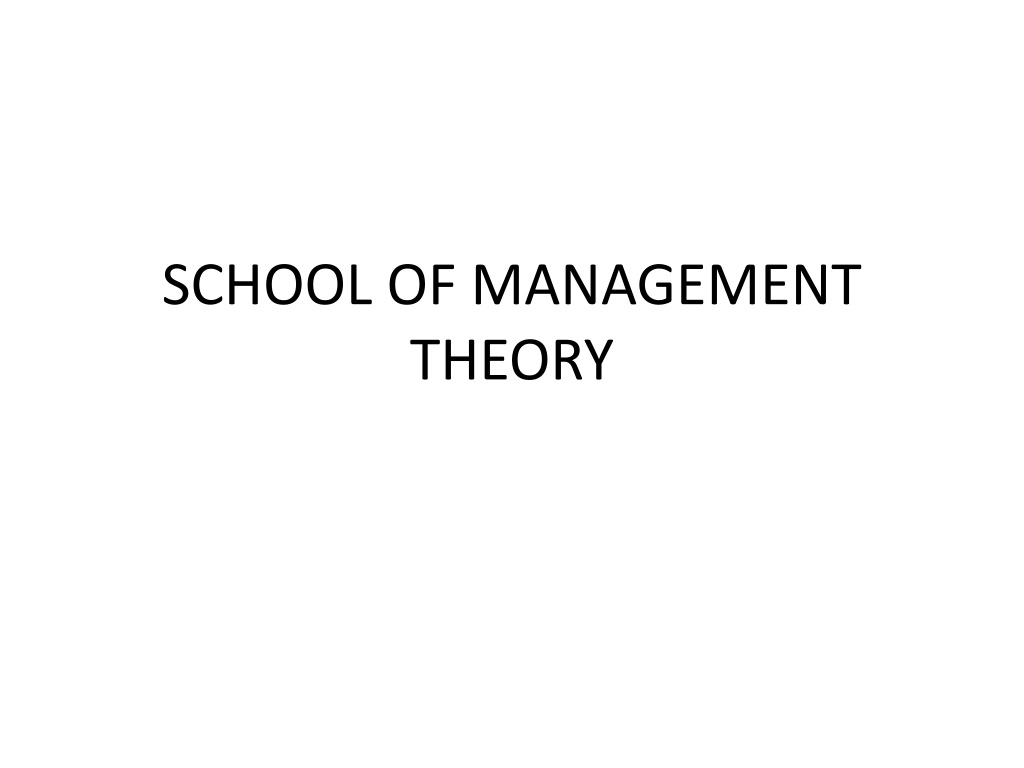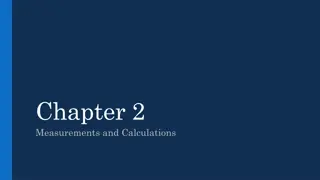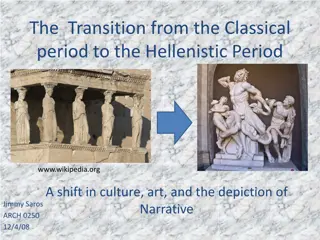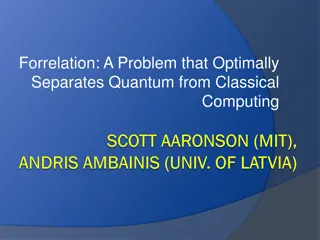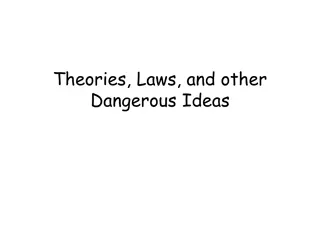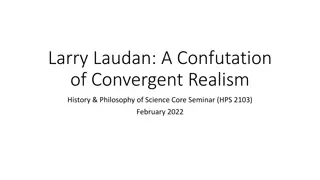Evolution of Management Theories: Classical Approach and Scientific Management
Explore the evolution of management theories focusing on the Classical Approach and Scientific Management. The Classical Approach emphasizes efficiency and specialization, while Scientific Management introduced systematic methods to increase productivity. Learn about key figures like Frederick Winslow Taylor and the principles they advocated for. Dive into the foundational concepts that shaped modern management practices.
Download Presentation

Please find below an Image/Link to download the presentation.
The content on the website is provided AS IS for your information and personal use only. It may not be sold, licensed, or shared on other websites without obtaining consent from the author. Download presentation by click this link. If you encounter any issues during the download, it is possible that the publisher has removed the file from their server.
E N D
Presentation Transcript
SCHOOL OF MANAGEMENT THEORY
The schools of management contributed to the development of management thought. They are grouped as follows: {A) The Classical Approach {B) The Behavioral Approach {C) The Systems Approach {D) The Contingency or Situational Approach
DEFINITION OF CLASSICAL APPROACH "Classical approach of management professes the body of management thought based on the belief that employees have only economical and physical needs and that the social needs & need for job satisfaction either does not exist or are unimportant. Accordingly it advocates high specialization of labour, centralized decision making & profit maximization."
Classical approach is the oldest formal school of thought which began around 1900 and continued into the 1920s. It is mainly concerned with increasing the efficiency of workers and organizations based on management practices, which were an outcome of careful observation. It mainly looks for the universal principles of operation in the striving for economic efficiency. Classical approach includes: Scientific Management Administrative Management Bureaucratic Management
SCIENTIFIC MANAGEMENT focuses on the "one best way" to do a job. ADM INISTRATIVE MANAGEMENT focuses on the manager & basic managerial functions. BUREAUCRATIC MANAGEMENT focuses on the guidelines for structuring with formalization of rules, procedures and a clear division of labour.
Frederick Winslow Taylor (1856-1915) Father of Scientific Management
STEPS IN SCIENTIFIC MANAGEM ENT Replaced old rule of thumb methods to eliminate ''soldiering'' Selecting training, teaching, and developing workers Supervise employees to make sure they follow the prescribed methods for performing their jobs Continue to plan the work but use workers to actually get the work done
Frederick Winslow Taylor The fundamental principles that Taylor saw underlying the scientific approach to management may be summarized as follows: Piece-rate incentive system Time and motion study Replacing rules of thumb with science (organized knowledge) Obtaining annoying group action, rather than discord Achieving cooperation of human beings, rather than chaotic individualism Working for maximum output, rather than restricted output Developing all workers to the fullest extent possible for their own and their company's highest prosperity. Taylor concentrated more on productivity and productivity based wages. He stressed on time and motion study and other techniques for measuring work. Apart from this, in Taylor's work there also runs a strongly humanistic theme. He had an idea list s notion that the interests of workers, managers and owners should be harmonized.
CONTRIBUTIONS OF THE SCIENTIFIC MANAGEMENT APPROACH Maximum utility of effort, therefore, eliminating waste Emphasis placed on fitting workers to specified tasks and further training them to best utilize their abilities Work design development has led managers to seek the "one best way" to get a job done Development of efficient technique through time and motion studies Incentives which include compensation plays an important role in productivity boost production line
CRITICISMS OF THE SCIENTIFIC MANAGEMENT APPROACH The desire for job satisfaction and other psychological variables were overlooked It concentrated more on stress economy and efficiency, thus, neglecting human factors It was mainly concerned with problems at the operational level. Hence, higher levels of management such as planning, decision making and problem solving were ignored
CRITICISMS OF THE SCIENTIFIC MANAGEMENT APPROACH (Cont,d.) It failed to take into account the impact of the forces of the environment on the organizations It did not offer a theory of administration or organization but only a set and simple injunctions for administrators to follow of principles
Henri Fayol(1841-1925) Father of modern operational management theory
Made three major contributions to the theory of Management: (A)A clear distinction b/n technical & managerial skills. (B} Identified functions constituting the management process. (C) Developed principles of management
(A ) According to -Activities of a n industrial enterprise ca n be grouped in to six categories: technical, commercial, financial, security, accounting & managerial.,
( B)Fayal described management as a scientific process built up of five immutable elements: Planning, Organizing, Commanding, Coordinating, Controlling Organizing Planning Commanding Coordinating Coordinating
Functions Of Management 1. Planning -process of activities required to meet a goal. 2. Organizing - making orderly determination & arrangement of a task 3. Commanding(Directing) involves guiding supervising, motivating & leading people for attainment of the time-oriented tasks. 4. Coordinating- bringing together the elements 5. Controlling- having control over all of the aspects that contribute to meeting the goal
( c ) Fayols Prinples 1. This is the principle of specialization which is so well expressed by economists as being necessary in the utilization of labour. Fayol goes beyond shop labour to apply the principles to all kinds of works, managerial as well as technical 2. Authority and responsibility In this principle Fayol finds authority and responsibility to be related with the latter, the corollary of the former and arising from the latter. He conceives of authority as combination of official authority deriving from a manager s official, position, and personal authority, compounded of intelligence, experience, moral worth, past services etc. 3. Discipline Holding that discipline is respect for agreements which are directed as achieving obedience, application, energy and the outward marks of respect , Fayol declares that discipline requires good superiors at all levels, clear and fair agreements and judicious application of penalties. 4. Unit of Command This is the principle that an employee should receive orders from one superior only. 5. Unity of Direction According to Fayol, Unity of direction is the principle that each group of Activities having the same objective must have one hand and one plan. As distinguished from the principle of unity of command, Fayol perceives unity of direction as related to the functioning of personnel. 6. Subordination of individual interest to general interest In any group the interest of the group should supersede that of the individual; when these are around to differ, it is the function of management to reconcile them. Henri Fayol, developed a set of 14 principles: Divison of work
7. Remuneration of Personnel Fayol perceives that remuneration and method of payment should be fair and afford the maximum satisfaction to employee and employer. 8. Centralization. Although Fayol does not use the term Centralization of Authority his principle definitely refers to the extent to which authority is concentrated or dispersed in an enterprise. Individual circumstances will determine the degree of centralization that will give the best over all yield. 9.Scalar Chain Fayol thinks of the Scalar chain as a line of authority, a chain of superiors from the highest to the lowest ranks and held that, while it is an error of subordinate to depart needlessly from lines of authority, the chain should be short-circuited when scrupulous following of it would detrimental. 10. Order Breaking this principle into material order and social order , Fayol thinks of it as the simple edge of a place for everything (everyone), and everything (everyone) in its (his) Place . This is essentially, a principle of organization in the arrangement of things and persons. 11. Equity. Fayol perceives this principles as one of eliciting loyalty and devotion from personnel by a combination of kindliness and Justice in managers dealing with subordinates.
12. Stability of tenure of Personnel Finding that such instability is both cause and effect of bad management. Fayol points out the dangers and cost of unnecessary turnover. 13. Initiative Initiative is conceived as the thinking out and execution of a plan. Since it is one of the keenest satisfactions for an intelligent man to experience, Fayol exhorts managers to sacrifice personal vanity in order to permit subordinates to exercises it. 14. Esprit de corps This is the principle that union is strength and extension of the principles of unity of command. Fayol here emphasizes the need for team-work and the importance of communication in obtaining it.
German theorist and sociologist. Follower of General Administrative Theory proposed by Henry Fayol. Introduce most of the concepts on Bureaucratic Organizations.
Birth of Bureaucracy During 1800 s European Org. were managed on a personal, family-like basis. Employees loyal towards a single individual. Resources used to realize individual desires. Weber envisioned Org. would be managed on an impersonal, rational basis. This form of Org. is know as Bureaucracy.
Characteristics o Org. based on rational authority would be more efficient and adaptable to changes. o Employee selection and advancement is based on competence and technical qualification. o Org. relies on rules and regulations which are impersonal and applied uniformly to all employees.
o Division of labour. o Positions in an Org. are organized in a hierarchy. o Managers depends not on personality for successfully giving orders but on legal power invested in managerial position.
Division of Labour Managers subject to rules & procedures Management & ownership is separate The Ideal Bureaucracy Decisions recorded in writing Positions organized in hierarchy Selection based on technical qualification
Limitations of Bureaucratic Management and Administrative Theory Classical theorists ignored important aspects of organizational behavior. They stressed productivity above other aspects of management. Weber s concept of bureaucracy destroys individual creativity and the flexibility to respond to complex changes in the global environment
Behavioral Approach It emphasized on the human element Behavioral thinkers Mary Parker Folet Elton Mayo Abraham Maslow Douglas McGregor Chris Argyris
Elton Mayo: Focusing on Human Relations Father of Human Relations Approach Led the team which conducted a study at Western Electric s Hawthorne Plant To examine the impact of illumination level on worker productivity The experiments were conducted in four phase: Illumination experiments Relay assembly test room experiments Interview phase Bank wiring observation room experiments
Illumination Experiments Took place between 1924 and 1927 Two group of workers (experimental or test group) and the control group Experiment involved manipulating the illumination Relay Assembly Test Room Experiments Took place between 1927 and 1933 It included the introduction of a series of HR policy measures for the test group to study their impact on overall productivity
Contributions of the Behavioral School 1. They discovered that a genuine concern for the individual worker leads to increased productivity. 2. Mayo s teaching place emphasis on the manager s style and drastically changed the training of managers. As a result, the teaching of people skills has become an important aspect of management training.
